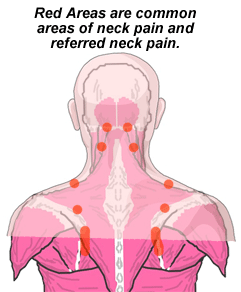Medical Library
Pick a Body Area
 Neck Pain
Neck PainNeck pain can be so mild that it is merely annoying and distracting. Or it can be so severe that it is unbearable and incapacitating.
Most instances of neck pain are minor and commonly caused by something you did. That is, if you keep your head in an awkward position for too long the joints in your neck can "lock" and the neck muscles can become painfully fatigued. Poor postures while working, watching TV, using a computer, reading a book, or talking on the phone with the receiver held against your shoulder and under your chin can be responsible for neck pain.
Neck pain that persists for many days or keeps coming back may be a sign that something is wrong. Disease, an injury (such as whiplash in an auto accident), a congenital malformation, or age-related changes may be responsible for more significant pain. A trained medical professional must determine the underlying causes of such neck pain. Examination and diagnosis by a medical doctor and treatment by a physical therapist may quickly relieve your pain or help you deal with it on a long-term basis.
Who suffers from neck pain?
Almost everyone experiences some sort of neck pain or stiffness at one time or another during their life. Because you walk upright and your head is "balanced" on top of your spine like a golf ball on a tee. The head weighs between 10 and 15 pounds. If the muscles that support your head and neck are not kept flexible and strong, poor and prolonged postures can put too much stress on the head and neck muscles and joints. This can lead to strains of the muscles and sprains of the ligaments that support your head and neck.
As we age, our joints wear out (this is called osteoarthritis) and the discs in the spine dry up and flatten (this loosely describes Degenerative Disc Disease). You may experience pain that radiates into the top of the shoulders or in between your shoulder blades. Occasionally, a pinched nerve (called radiculopathy) occurs and you may feel tingling, pain, and/or numbness radiating into the arm, forearm, hand, and fingers. As always, with persistent pain you should be evaluated by a medical doctor and seek treatment from a trained physical therapist.
Possible Treatments
- Aerobic/Endurance Exercise Video
- Core Strengthening Video
- Cryotherapy or Cold Therapy Video
- Electrotherapeutic Modalities
- Heat Pack Video
- Isometric Exercise Video
- Neck Active Range of Motion Video
- Neck Joint Mobilization Video
- Neck Passive Range of Motion Video
- Neck Resistive Range of Motion Video
- Neck Traction Video
- Posture Training Video
- Proprioception Exercises Video
- Physical Agents
- Stretching/Flexibility Exercise Video
- Aerobic/Endurance Exercise
Possible Treatment Goals
- Decrease Risk of Reoccurrence
- Improve Fitness
- Improve Function
- Optimize Joint Alignment
- Improve Muscle Strength and Power
- Decrease Nerve Compression
- Increase Oxygen to Tissues
- Improve Proprioception
- Improve Range of Motion
- Improve Relaxation
- Self-care of Symptoms
- Improve Tolerance for Prolonged Activities
Additional Resources
Disclaimer
The information in this medical library is intended for informational and educational purposes only and in no way should be taken to be the provision or practice of physical therapy, medical, or professional healthcare advice or services. The information should not be considered complete or exhaustive and should not be used for diagnostic or treatment purposes without first consulting with your physical therapist, occupational therapist, physician or other healthcare provider. The owners of this website accept no responsibility for the misuse of information contained within this website.
